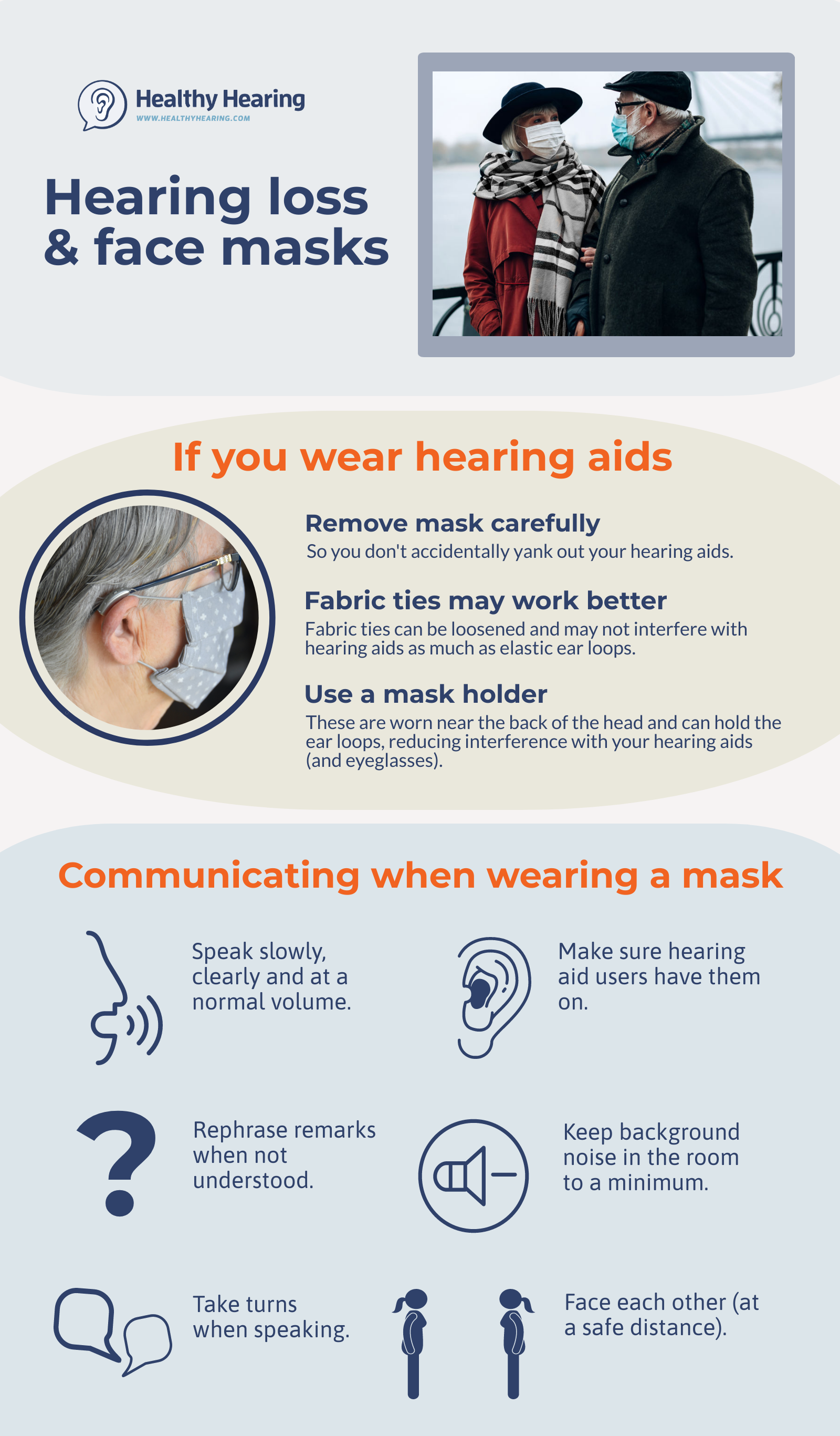Face masks are now required in many public places to help prevent the spread of coronavirus. For people with hearing loss, though, this may be easier said than done.
That’s because face masks add extra challenges for people with hearing impairments:
- It’s harder to understand people when they’re speaking to you with a mask on their face.
- If you wear hearing aids, the ear loops may tug on your hearing aids and cause other problems.
“I have yet to figure out a way to remove my mask without the hearing aids also coming off,” explained Martha Malan, of St. Paul, Minn. She normally wears hearing aids and eyeglasses. Now she also has to contend with elastic ear loops on the backs of her ears. “It’s a challenge.”

Wearing a mask with hearing aids
If you wear behind-the-ear hearing aids, you will likely encounter some problems trying to wear a standard face mask with elastic ear loops. The ear loops may tug at the tubing that connects the hearing aid to the speaker that sits in your ear (known as the dome). You also may inadvertently pull your hearing aids out and drop them when removing your mask. What’s a hearing aid wearer to do?
Because there are so many types of hearing aids, we recommend you first reach out to your hearing care provider who may have solutions they’ve come up with when talking to other patients. Also, we’ve seen lots of creative workarounds floating around out there, including:
- Wearing a mask with soft fabric ties to relieve the pressure on the ears, instead of elastic
- Using a special mask extender with buttons or other holders to attach the mask loops onto, on the back of the head, instead of the ears (many medical practitioners now use these, since they have to wear tight-fitting masks all day)
- Using simple tools like plastic s-hooks to loop the mask onto, instead of your ears
“There have been calls for the public to use transparent face shields, rather than masks, which may offer a solution. But the public has yet to adopt this solution,” said Kevin Munro, PhD, professor of audiology at the University of Manchester in the U.K.
Speaking to people with hearing loss when wearing a mask
In medical settings
People with hearing loss also face challenges when trying to listen to someone who is wearing a mask. In medical settings, where stress is running high and provider-to-patient communication is tantamount, this can lead to frustrating scenarios on both sides.
“Masks pose two obvious problems for patients with hearing loss: the patient cannot gain any cues from lipreading, and the voice of the healthcare provider is attenuated and distorted,” note the authors of the study “How do medical masks degrade speech reception?“, published in The Hearing Review. (In this context, “attenuated” means a mask lowers the volume of a person’s voice.)
When combined with the clamor in many hospitals—and the lack of visual cues because the wearer’s mask is blocked,—speech could be “close to unintelligible” for many hospitalized people with hearing loss, the study noted.
To help, the authors provided this checklist for talking to patients with hearing loss in medical settings:
- Reduce the room’s noise and get the patient’s attention
- Ask how the patient prefers to communicate
- Speak slowly and clearly
- Do not shout (this can be painful to a person with hearing loss)
- Make sure hearing aid wearers are using them
- Consider using a portable hearing aid amplifier
- Rephrase remarks if not understood
- Take turns while speaking to the patient
- Do not talk while walking
- If obtainable, masks with clear plastic make lip reading easier
“Speakers often naturally try to compensate by projecting, but a more effective approach is to speak more clearly, with greater enunciation,” explains Nicole Marrone, PhD, associate professor in Speech, Language, and Hearing Sciences at the University of Arizona.
In public settings
When out in public, such as at a shopping trip, these tips can’t always be followed. But, for example, if you and your spouse are both wearing masks, make sure your spouse is aware they must speak more slowly and clearly to you. And speak up for yourself when talking to strangers, letting them know you can’t hear well and need them to speak more clearly.
If you’re the one trying to speak to someone with hearing loss, “use some creativity to get your meaning conveyed, instead of repeating the same misunderstood phrases over and over again,” recommends Dr. Mandy Mroz, AuD, president of Healthy Hearing. “Don’t underestimate the power of body language, eye contact and slowing down speech to be more clear.”
More COVID-19 resources for people with hearing loss
(Editor’s note: Malan is the mother-in-law of the author of this article.)
